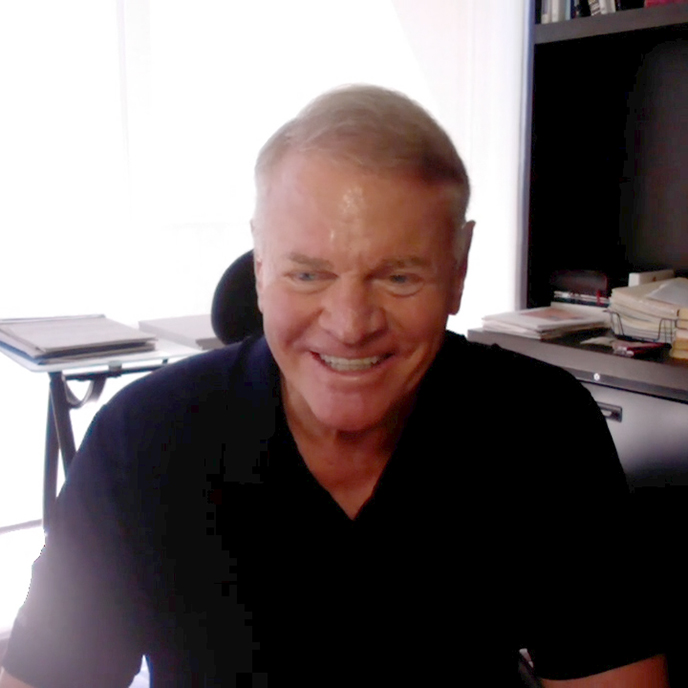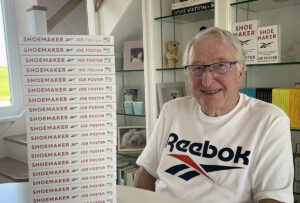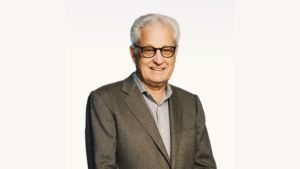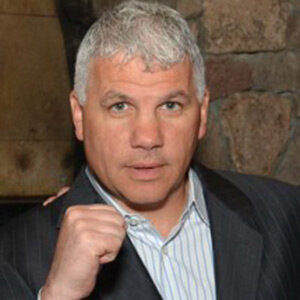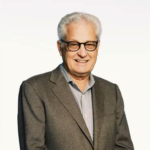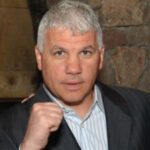View this episode's trailer
Episode Description
“Every cell in your body is listening to your brain… I think a big part of cancer survival is believing there is a better path.”
According to Dr. Onik, Jeff Olson is a modern Renaissance man—entrepreneur, author, publisher, and member of the Happiness Hall of Fame. He’s also a prostate cancer survivor who knows when life is going great, how it feels to be told you have cancer. “I felt betrayed because I’m very healthy in my diet and lifestyle,” Jeff says of his diagnosis. He knew that his solution would need to allow him to live without obliterating his life. For Jeff, the spiritual aspect of healing was just as important as having the support of family and friends.
Dr. Onik reveals the one aspect of prostate cancer that he finds heinous is the lack of information patients get about radical prostatectomy and the positive margin. It’s so important for patients to do their own research and find treatment options that work for them. Going against mainstream medical advice is difficult. Anxieties and fears affect the immune system and spiritual grounding can help you remain calmer and heal better.
You’ll be challenged to consider these critical life questions:
- What do you allow your conscious brain to think?
- How do your BELIEFS influence your HEALTH?
- Who do you associate with?
- How do miracles happen?
- What’s the power of prayer, scientifically?
After a cancer diagnosis it might be time to reconsider why it’s said, “There are no atheists in the foxholes.”
For over 40 years Dr. Gary Onik has been pioneering advances in cancer treatment that have rocked the field of oncology, inventing an entirely new branch of cancer treatment now known as “Interventional Oncology” based on his innovative minimally invasive techniques. Both doctor and patient, he created a cancer vaccine and successfully treated his own terminal prostate cancer using his invention. In addition to his medical practice, Dr. Onik is an Adjunct Professor of Mechanical Engineering at Carnegie Mellon University, working closely with his colleagues to develop the next generation of cancer fighting technologies. His latest work, using immunotherapy to treat metastatic cancer, offers hope to those patients with literally no other options.
TO CONTACT DR. ONIK visit https://www.garyonik.com/.
TRANSCRIPT
Dr. Gary Onik [00:00:00] Hello, I’m Dr. Gary Onik, and I’m your host for Cancer is Tough, but YOU are TOUGHER! I want to thank The Beach Boys for allowing us to use their piece of music that is dear to my heart. My podcast is uniquely personal. I know both sides of the cancer equation. I am a cancer specialist and researcher, as well as a cancer patient and survivor. I will address various treatment modalities in the podcast, but that’s not really what this podcast is about. This podcast is about the unique cancer journey that a patient and their family and friends take when they are diagnosed and treated with this dread disease. We’ll delve into the inner emotional and spiritual resources. Patients and their loved ones need to address their concerns of choosing a treatment strategy that will harmonize with their worldview while grappling with state-of-the-art treatments versus alternative treatments. When I was asked who’s going to be my target audience, the obvious answer was everyone. It’s a rare person that has not had cancer touch their lives, either as a patient, a family member or friend. If you’re that rare person that hasn’t had cancer touch their lives, almost certainly at some point, cancer will drag you into its maelstrom. I hope that you find this show both a resource and a comfort in dealing with your cancer journey.
Dr. Gary Onik [00:02:07] It is my privilege to have as a guest Jeff Olson as Jeff is truly what one would have to call a modern-day renaissance man. He has not only founded and is CEO of what’s now one of the most successful direct to consumer marketing companies in the world, Neora. He is also a bestselling author, a motivational speaker, a philanthropist, and publisher of the magazine, Live Happy. He is also a member of the Happiness Hall of Fame. I have to tell you; I really have award envy over that. I want to know how I can get into the Happiness Hall of Fame, I’m a happy guy. I want to thank Jeff for coming on and talking with us today. Jeff, could you give us a little bit of background, your history going back to when you were a young guy, a really young guy running an airport in Texas?
Jeff [00:03:28] Glad to go back. It wasn’t Texas; it was actually Albuquerque, New Mexico.
Dr. Gary Onik [00:03:33] Oh all right.
Jeff [00:03:35] I’m a kid who grew up blessed, by that I grew up very, very poor and… but I grew up with great people around me that cared. I grew up in a country, really a state that’s mostly made of Mexicans, and I’m a very quiet blonde person. So, I was raised by a lot of Mexican families, and they’re just the most beautiful, loving people. But after, when I was an undergraduate, I started working as an intern at the local airport, Albuquerque International Airport. And through that just kind of worked my way into the management side of the business when I was in graduate school and then they made me the airport supervisor, eventually became a manager of the airport. So, I was doing that at a young age of 22 or 23 and that kind of opened the door for me to go to Texas Instruments, which opened another door and another door. And that’s kind of how life works but it was a great experience because it was like most of it happened, not because of my knowledge of airports and airplanes and leasing, but my ability to work with people. And it was kind of an eye opener to me that if anything, it is built on people. Your ability to work with people will be the number one thing that will determine your success, not really your knowledge about the product but the people. And so, it was just a good start for me. I was very blessed.
Dr. Gary Onik [00:04:52] And when did you move into becoming an entrepreneur?
Jeff [00:04:57] Well, I was at Texas Instruments, which is a, at that time one of the top corporations in all top 190,000 employees and climbed the corporate ladder pretty fast there in what we call the Equipment Group, I became a manager once called the Intelligent Systems Group. That’s a whole long story. And I was going very well, but I really… it wasn’t that I disliked Texas Instruments disliked people there, I really just didn’t like the bureaucracy of it. The inability to, it was fun being involved, and it was fun learning, but I didn’t feel like I had as much control, and not that I’m a control freak, but I just wanted to move faster, let’s say that. But also, in that job I was working with a lot of small companies and meeting people who had started their own businesses. And you know, these are smaller companies they weren’t multibillion dollar company like Texas Instruments, and I just loved who they were as people. And so, I decided to become an entrepreneur. So, I just quit, you know, and without really knowing where I was going to go and I tried a couple of things that didn’t work quite… they weren’t, didn’t fit my wheel house. And then I ran into solar. You know, I knew nothing about solar, but solar was really hot back then and it was really big back in New Mexico. So, I went back to New Mexico and started a solar manufacturing company and turned into a manufacturer marketing and distribution company, ended up being one of the largest solar companies for not just manufacturing, but set up distributors and marketing around the United States. And so that was my first real step into successfully being an entrepreneur. OK, well.
Dr. Gary Onik [00:06:31] I think we’ve all had those unsuccessful steps into being an entrepreneur as well. You know, failure is one of those things you have to have at times. Did all of that experience bring you into the ideas that you have expounded on so eloquently, really, in the Slight Edge?
Jeff [00:06:54] They were evolving, you can say that, at that time I hadn’t put words around them and, you know, from there I’d gone on and from the solar business I went on and became a marketing director for a company called NSA and ended up really, we grew their sales from like about eighty million to two hundred something million. And then I went over to a company called Quorum, which was an electronics distribution marketing arm for a public company out of Hong Kong. End up being the CEO for them. And that’s where it all started to happen for me, I started seeing something that… I started seeing too many good people not doing the activity, although they were talented enough to do the activity, but not doing it consistently, persistently long enough to be successful. You know, it’s kind of like you plant seeds, you cultivate the seeds and eventually you harvest; that 80 percent of work is done before you see any kind of results. But, it’s easier to do that in a corporate structure because you’re, you know, you’re structured to go to work at a certain time, go to a certain place, do a certain thing, and you’ll do that over and over and over and over again, I did it over and over again for a decade. But entrepreneurs have to have, their only, the only office they have is in their head. They have to have the discipline to show up every single day, consistent, persisting like you would if you were in a corporate business where you are, you bought a big franchise. So that’s what that book was all about is getting people to understand the importance of baby steps and not just baby steps in an individual moment, consistency over more time and how the compound effect to kick in. And it just resonated. I didn’t write it to be an author. I wrote it to get out of my head and get people quit asking me about it because I started teaching it. It was affecting people and I never put it on a book stand or anything like that, and I just gave it to over 100 people that I know. Say, here’s a book, kind of “quit asking me, want to get it?” And it’s exploded to millions and millions and millions of books, and it’s used in sports teams, in hospitals, and universities, and corporations. And so, it’s organically grown, which is a neat thing because I think that speaks to the, um, to the message that resonates and it’s real for people; it’s not just something that’s been marketed.
Dr. Gary Onik [00:09:05] So now you’ve become a successful entrepreneur, a successful author, and life is going great. And then all of a sudden somebody tells you; you have cancer.
Jeff Right. Been there. You were there.
Dr. Gary Onik I was there, I was there as well, and I mean, I can remember everything about that day. I can remember exactly how I felt. Was it the same with you?
Jeff [00:09:33] It’s almost like I felt betrayed because I’m very, very healthy. I am [inaudible] one half a percentile in how I live my life as far as diet, exercise, supplements, you know, everything to keep healthy. And you know, I’ve done the gene sequencing that shows I don’t have any issues and that type of thing. And all of a sudden one day, you know, when I went in for the results, went to get the, you know, you know, there’s no issue OK. And I got, there is an issue and it just stunned me, quite honestly. And like I said, that’s what I can say is I felt betrayed. By who? I don’t know, I guess just betrayed by life. But and uh, you know, very quickly, that’s that. What I realized really quickly is I was going to find my solution and the solution everybody else follows. I was going to look for something that allowed me as a person to live my life going forward, you know, without that cancer. So, it was just like anything else. I set on a journey to figure it out.
Dr. Gary Onik [00:10:35] Have you dealt with other people that you know now with cancer, and has that helped you relate to them and be more helpful to them over the…
Jeff [00:10:47] Yeah, of course it does. I mean, anytime you experience something like, you know, you can’t know that feeling unless, you know that feeling. You can’t know what you don’t know and so you almost feel like, golly, I remember people shared with me they had a debilitating illness or cancer. And I was there for them but was I really there for them? You know, you’re just your patience, you’re there being for the person when you find out about it because you can relate to them and identify with them and hopefully be part of this emotional struggle, but also part of, you know, they’re going to have to start figuring things out. And quite honestly, I think it’s very dangerous if you just follow the path everybody follows, and I’m not on here to get my opinion about the medical system.
Dr. Gary Onik [00:11:36] Well, you can.
Jeff [00:11:39] But I think it’s very dangerous just to get in line and just follow the troops. I think you need to start looking, you’re really asking questions and looking for solutions. And so, I did that for a friend. He ended up with it and I guided him through. Here’s what I’ve experienced, and I pointed him in different directions, and he ended up being able to resolve his prostate cancer without this obliterating his life. That’s kind of the answer. This is… obliterate; your prostate. That’s just not that’s not a necessary solution these days. So.
Dr. Gary Onik [00:12:17] You know, I think that if I had to point to one aspect of prostate cancer that I find almost heinous, actually, is the lack of information that patients get about radical prostatectomy. Now, you must have talked to doctors about radical prostatectomy, I mean, you probably looked at the range of things I would assume, before you decided on what you were going to do. And one of the things that physicians never tell urologists, never tell patients is that a large portion of the time, 25% of the time, they don’t remove the whole cancer. That they leave cancer behind, and that’s called a positive margin. And I can tell you in twenty years in dealing with prostate cancer, more even, I’ve known two or three patients out of all of those, the patients that I’ve seen, that were ever told about a positive margin because if you’re told that 25% of time they are not going to cure you, well, then of course, you’re probably not going to be choosing a radical prostatectomy with all the problems associated with it. So, yeah, patients have to do their own research and find something that works in particular for them. I have patients that come in and say, you know, I don’t care about my sex life, I just want the best cancer treatment as opposed to other patients who come in, such as me, I mean, there was no way that I was going to go on hormone therapy and give up my sex life. You know, I basically said, really, I’d rather die, you know, die in a way, you know, let me die with dignity. But I’m not going to live a life that, you know, is so limited, you know, by my treatments. How did you find family support helped you?
Jeff [00:14:27] Well, it’s family support, and it’s people-who-love-you support, your family’s bigger than just your blood family, OK? And I found that, you know, I’ve always been a person who has built and nurtured relationships, and so I was able to lean on them. I didn’t broadcast it to the world. I kind of kept, didn’t broadcast it out, but I kept it to my family. They, of course, obviously loved me and supported me. They would understand when I said, this Is the route I’m going. They didn’t know anything about the other route, OK? But when I told them what it was and why, they supported it more than anything else, and that was a very easy, easy part for me; the friendly support I got from my friends. The hard thing is the medical system is set up so one-sided, going one direction, you know? And, you know, quite honestly, the worst person to ask about health is a doctor. Most of them are not in good shape, they’re not taking care of… they don’t know anything about nutrition, they know very little about diet, and they, look at them alright? And so, for me to listen to a person who is… their only answer is just one answer, that was the main thing I was looking for support; that I wasn’t crazy walking away from what eighty, ninety-five percent of people were going to do. That I was going to do something different, you know, because I was like you. I wanted to live my life, you know, I wanted to live large, I didn’t want to live… I didn’t want to shrink away from life because of it. And I was willing to do what was necessary. And it’s just, you know, there’s always an answer out there you just don’t know where the answer is at, you just got to start looking. And I think the other thing that happens, you know, this is not just your family relationships. I think your spiritual relationship goes up significantly. It shouldn’t have to have that, for that to happen but it does. You know, I just had a friend recently passed from breast cancer and watching her go through it made me even more spiritual than I would have been if I hadn’t gotten through that with her. And again, I said, why does it take that kind of thing? Death experiences, near-death experiences, you know, to do that. But the truth is, it does. And maybe that’s just one of the main reasons it’s there. It’s because you… it was always there. But you know, that tragedy in your life opens the door for you to be more receptive to that, whatever that source is for you, OK? But I can tell you, for me, the spiritual part of it was just as important as the family part for me.
Dr. Gary Onik [00:16:59] No, I completely and utterly agree with you that for me as well, the spiritual aspect was a critical thing in terms of delaying fear. You know, there’s such a connection between your mind and your body, and we know that your anxieties and your fears do affect your immune system and how you will do with something like cancer. And what I’ve seen is that my patients who have some spiritual grounding are so much calmer with the situation. And, you know, because look, if you think this is all there is, then of course you’re going to be anxious and fighting for every second, because you don’t believe that there’s something after this. I gained my grounding in spirituality from the book The Field by Lynne McTaggart, which you know, it’s beyond the scope of what we’re talking about here, but basically gave me a scientific basis for spirituality that I otherwise wouldn’t have. I mean, you know, we’re kind of empiricists early on, you know, if you can’t feel it, touch it or measure it, then it doesn’t exist. And you know, finally, with the idea of quantum physics and the something called the zero-point field, there was a way for me to see how the spiritual actually had a scientific basis. So that was a very, very important aspect for me.
Jeff [00:18:58] It’s interesting because I did go down that. I went and I got that book for me, so I know what you’re talking about, but I read some other stuff too. One of the greatest lines I’ve heard is every cell in your body has tons of cells, hears every emotion, every thought that you have, OK? So, in essence, it hears it and it’s been affected by it. And that you got to very, very consciously what you let your conscious brain think, you know, project. And that’s, you know, that’s why affirmations work and prayer works and meditation works. Even storyboards work where your conscious brain speaks to your subconscious brain, tells you what I want. The subconscious brain doesn’t think for itself, it just obeys like a slave. But that is the pathway to quantum physics. The subconscious brain is the pathway to… some people call it the universal consciousness, you know, the “her” consciousness, whatever you might want to call it, so people can call the divine. But people don’t realize how important that pathway is and how important your thoughts are, your beliefs are. And when you focus on negative things, negative things grow. When you focus on positive things, positive things grow, and in today’s society it’s really challenging because the media is not reinforcing it, you know, whether it’s in, you know, I really pay attention to my philosophies and how I think. And then, you know, your philosophy is everything you know and how you hold it and how it affects what you do and that’s based on podcasts like this, you listen to it. Quite honestly, one of the biggest ones, which you referred to earlier is who we associate with? I mean, you are the combined average of the four, or five, or six people you associate with the most. And you got to be very conscious of that. If they’re not, don’t have a positive outlook on life, it’s hard for you. If you could find that in your life and consciously, you know, focus on feeding positive thoughts and things into your subconscious brain, it’s amazing what it’ll start doing for you. I mean, things start happen, you can’t even imagine. And then, you know, that’s what prayer does, again that’s what meditation does. It gets you focus on things. So, you know, I think a big part of cancer survival is getting the brain in a positive place, believing, you know, in the future to see in the future and believing that there’s a better path. And because, you know, every cell in your body is listening to your brain and your brain controls every cell in the body, you know, there’s tons of research about miracles that happen because something, just a thought process, not the physical things they… You know, I know you went through that journey pretty hard and I believe in it and I believe it now more than I ever have, because since then I’ve started reading a lot of books about prayer, you know. My books are more scientific books. How prayer works scientifically ok, because I’m like you, everything’s got to quantify, you know, and but… you start realizing the power of it, okay, and that’s not a gift you can give to people when they fall into the zone, especially cancer, if they have cancer.
Dr. Gary Onik [00:22:02] Yeah, you know, I try and raise it with my patients. You know, there’s that saying that, you know, there are no atheists in the foxholes. And sometimes if you’re, you know, if you’re not ready for that because you’re dealing with all the worldly things in your life, all the things, getting ahead and making money, doing all of those things. And then all of a sudden this happens, and it may be time to begin to reexamine that. So, I try and push my patients toward a little bit of reexamining that because it’s important to how they’re going to do. Absolutely.
Jeff [00:22:53] I agree with you. Your emotional state is as important as your physical state. It really is.
Dr. Gary Onik [00:22:59] Well, I am so glad that you are doing well, and I am so proud that I can call you a friend.
Jeff [00:23:07] Thank you. Same here.
Dr. Gary Onik [00:23:08] And I want to thank you so much for coming on and giving us your perspective and telling a bit about your story and what’s important to you in this journey. Because, you know, now we’re cancer patients.
Jeff [00:23:22] We are the rest of your life.
Dr. Gary Onik [00:23:24] The rest of your life. Thanks.
Jeff [00:23:26] Watch that PSA count all the time.
Dr. Gary Onik [00:23:31] Jeff, thank you again. It has been a pleasure.
Jeff [00:23:34] Thank you. Be blessed.
Dr. Gary Onik [00:23:36] You too.
Dr. Gary Onik [00:23:53] Hello, this is a segment of the podcast we talk about the hopeful trends in oncology, treatment, and administration. Vincent DeVita in his book The Death of Cancer, talks about the attitude that an oncologist should have in terms of trying everything possible to keep a patient alive because you never know when the next great breakthrough is going to happen that could change that person’s trajectory and save his life. And that’s really the attitude I have as well. So, this is an important segment of the show because, you know, we hope to talk about those types of things that might be able to give you hope and change the course of your cancer if you fall into that type of category. A topic I’d like to talk to you about today is something called focal therapy for prostate cancer. This was introduced back in 2002 in a paper written by a fellow by the name of Dr. Gary Onik. Oh, that’s me. And at the time that I wrote this paper, and it was published, it was incredibly controversial. Basically, what I said was that a patient who had cancer in their prostate gland didn’t need to have their whole gland removed, or radiated, or frozen. Why couldn’t we treat a prostate gland just like women had breast cancer treatments where they only had the lump removed? And so, I collected nine cases at that time, I believe, and what I showed was that you were able to just treat the cancer and get good long term cancer results. The other critically important aspect of focal therapy, or what we call the male lumpectomy, is that it markedly reduces the chances for complications. So not only are you getting an efficacious cancer treatment, but you are also lowering your chances for incontinence—in focal therapy incontinence is virtually zero—and impotence. The studies that we have done alongside the studies of other investigators such as Duke Bahn, have shown that 90% of patients who are potent for focal therapy, are potent after focal therapy. So, in this, we actually get a very rare occurrence where you make a change, and usually there’s, you know, if you increase the likelihood the patients are not going to have complications, usually you pay for it with decreased efficacy and vice versa. In this case that’s not what we found. As time went on, resistance to this concept changed. At first, literally, I was lambasted for going against the concept of a whole planned therapy. Right now, and this is the good news, is that virtually every major cancer center in the United States and in the world that has a urology program is doing focal therapy. How they’re doing it can vary. I like to use cryotherapy because it has the longest history or something called irreversible electroporation, which is the electrical killing of cancer that has certain advantages. Others might use high intensity focused ultrasound or some chemical treatment. The main concept is you don’t have to treat the whole gland. You can get cancer results that are just as good as if you remove the gland, in a lot of ways, much better. Let me just take an aside and talk about radical prostatectomy. I want patients when they are diagnosed with prostate cancer to explore all of the options for them. You know, they should look at radiation in radical prostatectomy, as well as ablation therapy, high intensity focused ultrasound, cryoablation and irreversible electroporation. What patients aren’t told about radical prostatectomy is that there is something called positive margins. That means that when the gland is removed, the surgeon cuts through the cancer and leaves cancer behind. That’s a disaster for a patient. It means high likelihood that they’re not going to be cured. That means they have to undergo other therapy, such as radiation and androgen deprivation therapy, basically chemical castration. And you would think that this would be a rare occurrence, but it happens anywhere from ten to fifty percent of patients. If you’re going to explore radical prostatectomy, ask your physician about his positive margin rate so that you know how good he is at doing that operation. If he can’t tell you, then you shouldn’t be going to that physician. But it should raise the question of whether radical prostatectomy is for you, in any case, because once you recur after radical prostatectomy, you’ve got a real serious problem. Now with that said, some of my best friends are urologists. What bothers me about radical prostatectomy and particularly robotic radical prostatectomy is the fact that patients are never told about positive margins. I’ve seen hundreds and hundreds of prostate cancer patients. And I can think of maybe one or two that when I asked them about positive margins actually knew what it was. So, the urologic community that does robotic radical prostatectomy is hiding the fact of positive margins. And why would they do that? Well, they do that because nobody really wants an operation. And they know it has complications such as impotence and incontinence. And if you also tell them that it’s not going to cure them in a high percentage of patients, who’s going to choose it? So, to continue doing that operation, I’m really sorry to say that the most important fact about the operation is not being told to the patients. So now, you know, and now you can ask about it and evaluate the pluses and minuses of a radical prostatectomy. A lot of patients don’t want to have let’s say, an ablation therapy such as cryosurgery or radiation, because they want the cancer out. That’s a valid point. Just know the facts about it and take them into account in your decisions.
Dr. Gary Onik [00:32:22] So we now come to the segment in the podcast where we answer the questions from our listeners. And so out of our mailbag comes a question from Dylan, who’s from Kansas City. “I have prostate cancer. My cancer is of a middle aggressiveness. Being an engineer, I am evaluating the treatment options with an open mind and from a technical point of view. I am leaning toward having a more innovative treatment, such as a laser ablation of my prostate. For our listeners, the laser ablation of the prostate takes a needle that the laser puts it into the prostate cancer under an MR guidance that can see the lesion and it’s ablated and it’s an outpatient type procedure. In addition, the procedure is not covered by insurance, and so would cost me a significant amount of money. My wife, who’s a teacher, wants me to have the traditional treatment, which is a radical prostatectomy and have my prostate removed. How do we solve this dilemma?” That’s a good question, and it’s a situation that, you know, I faced a number of times. The male patients that I have who I am treating for prostate cancer, I strongly encourage their wives to be part of the process. And occasionally there is a discordant view of what should be done. Firstly, I would say do not let the money aspect of this come into your decision. I’m assuming that, you know, the laser ablation in the prostate, it’ll probably cost about $25,000 out of pocket, and I’m assuming that that’s not an overwhelming burden for you and therefore I would not let that become an issue in this, in your choosing. I unfortunately had a patient who actually I never saw. I spoke to him on the phone. He had a very aggressive tumor. He was clearly better treated with an ablation therapy rather than radical prostatectomy because when you have a very aggressive cancer and you’re high risk, the chances that they’ll cut through the cancer and leave cancer behind is very significant. So, I counseled him to look toward some other treatment, and I thought that an ablation therapy would be superior for him. His wife was very against the ablation therapy, and it turned out that a good portion of that was the fact that, you know, he would have to pay for the procedure. He went on to a radical prostatectomy and he had a positive margin. They left cancer behind. He had some significant incontinence with it and then had to go on to all of the other treatments that were associated with it. And he called me up and said, you know, is there something you can do for me now? And unfortunately, I had to say that, you know, really, that horse had left the barn and, you know, there was nothing we could do. If someday he had metastatic disease, we might be able to help with that. But you know, that was a situation that he should have followed what his thinking was. And I think that really comes down to that. You’re the answer for you. This is your decision. Ultimately, you have to feel comfortable with it. You have to understand what the risks and the benefits are and then make your decision, and this way, if it doesn’t work out well… Well, if it works out well, let’s not talk about the negatives here. I don’t like talking about the negatives. I am like the glass half full guy. I’m the glass full guy who every once in a while, you know, a few drips come off the top. So, let’s assume that, you know, the first portion is you do well, then everything is great. If you don’t do well, then certainly your wife wouldn’t want to be in the position that she influenced you to do something that didn’t turn out well. So, I think, for the health of your relationship, it’s best that you make the decision. Hopefully she’ll support you in that. I’m sure that when you make the decision, she will and this way, you know, no matter what happens, you will keep a nice, healthy, loving relationship.
Dr. Gary Onik [00:37:43] If you would like to ask us a question for the mailbag, you can go to garyonikmd.com. There is a contact form that you can fill out that will be forwarded to us, and we’ll consider your question for our show. Thank you for listening to our podcast. I hope that it provided you with some useful information, some hope and some comfort. Thank you very much.

